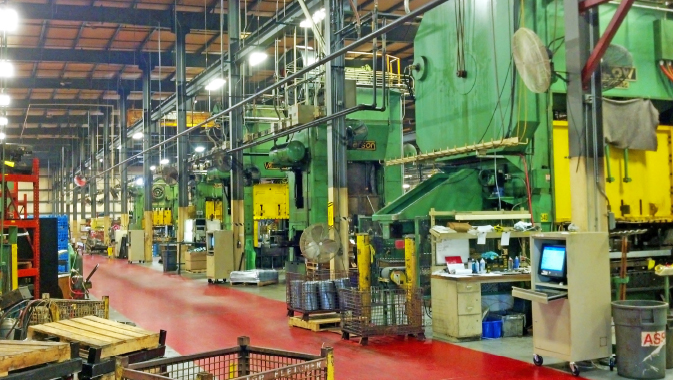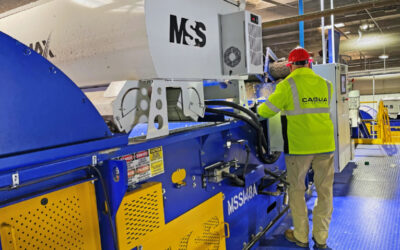Pentaflex, Inc. is a hard-working contract manufacturer on the comeback trail. Headquartered in Springfield, Ohio, the firm makes metal stampings and assemblies and serves customers across the Midwest. A dip in the truck market has meant a decrease in revenue and personnel at Pentaflex, but the company is determined to regain its market position, attract new customers and promote Made-in-America manufacturing.
~
Pentaflex’s clientele includes customers from the commercial truck and automotive, medical, agriculture, energy and off-road industries. To complement its stamped components, Pentaflex can offer a variety of services from assembling purchased components to washing parts, machining and welding. The firm maintains a metal stamping tool and die shop to keep tooling in peak form.
Pentaflex was founded in 1972 by Jack McGregor. “When he started, he had five investors, including himself. They all came from different backgrounds. So, they called it ‘Penta’ for five, and ‘flex’ for flexible because of their different backgrounds,” explains Pentaflex president and CEO Dave Arndt. Mr. McGregor died in the 1990s, but the company is still owned by his wife and family.
The company’s focus was much the same in the early days as it is now. From the start, Pentaflex’s large tonnage hydraulic and mechanical presses were capable of making the most complex of deep draw heavy gauge parts in a variety of materials.
“Our customer base is mostly in the Midwest, but we also supply to Mexico, Brazil and Europe. But we do that through our customers,” says Arndt. Major customers include Meritor, Eberspaecher, Bendix, Vibracoustic Automotive, and Ford.
The company relies on high-tech software for design purposes. Engineers use CAD software, for example, to design tooling and components, and forming simulation software to analyze material characteristics to predict how it will stand up to the stresses of forming. The company is renowned for making high-end prototypes of client’s proposed designs or variations of existing products.
At present, the truck segment is the most important part of what Pentaflex does. “Contract stamping for truck Tier 1 suppliers is about eighty-five percent of our business,’ says Arndt.
For a variety of reasons, however, the truck market has been down. These include unsteady economic conditions and the market not being unable to absorb as many trucks as anticipated. The end-result has been a dip in Pentaflex’s business. Revenues rose steadily, from $25 million in 2009 to $35 million last year but have since stalled.
“This year, the truck market is suffering, so our sales are down,” states Arndt. Likewise, Pentaflex has roughly 105 employees, down from 140 last year.
“When the market came down, we reduced our headcount. We hope the truck market takes off again so we get back to 140 … we’ve had significant reductions in staffing. We had to go from three shifts back to two shifts,” says Arndt.
The company should soon be able to lessen reliance on the truck market. Over the past four years, Pentaflex has spent around $10 million in new equipment, “as we try to diversify our capabilities and support a wider base of stamping and welded assemblies,” says Arndt.
Back in January 2016, Pentalfex completed a 26,000 square foot expansion of its current plant in Springfield. The expansion was done to accommodate existing and future business.
In terms of new clients, the firm is looking to expand the amount of automotive work it does.
Interestingly enough, one manufacturing challenge he is not worried about is offshoring. The reason is simple: “Because the weight of our components. You don’t ship them from China.”
Through all this, Pentaflex remains devoted to its ingrained principles of high quality, excellent customer service and worker safety. In terms of quality, Pentaflex is ISO/TS 16949 certified and has a full quality laboratory.
“We have daily meetings in the morning. We have the operations, quality, tooling and maintenance leaders altogether for a twenty-minute stand-up meeting in what we call our war room. In the war room, one wall has data about safety and staffing, a second wall talks about quality/productivity; the third wall talks about machine run performance, and the fourth wall talks about maintenance and tooling and other issues we want to highlight. We go through those issues on a daily basis, assign tasks and champions and make sure we follow up on things. Quality is a very important thing for us,” says Arndt.
Pentaflex’s focus on quality has been recognized. Last year, the company won the Meritor Trailer Supplier of the Year award, an honor it also picked up in 2014. The award is based on “quality and delivery and support for our customers,” says Arndt. Company staff are eagerly waiting for an announcement in October to see if the firm won the 2016 award as well, he adds.
This isn’t the company’s only recent honor either. Between 2013 and 2014, Pentaflex received four manufacturing excellence awards from the Precision Metalforming Association.
As for safety, when new employees start, they go through a half-day training session which introduces them to company safety expectations and how to conduct themselves on the shop floor. In their first month on the job, new hires get another four hours worth of safety training. Then, at the end of their second month, there’s an additional four-hour safety training session.
This devotion to safety has produced results. “Our record right now is 260 days without a lost-time injury,” notes Arndt proudly.
Pentaflex’s safety and quality-first approach also applies to suppliers. “We have a preferred supplier listing that we use. We want suppliers to be either TS or ISO certified. We look at what their customer base is,” says Arndt.
Pentaflex’s corporate culture is built around notions of quality, safety and service and respect.
“[Regarding] our corporate culture—whenever we have a management meeting, there’s three things I try to stress. First thing is we want everyone to go home safe every day. So, you should pay attention to what you’re doing. Second thing I try to stress, if we deliver quality products to our customers on-time, we’ll be profitable and this will ensure everyone’s jobs. The third thing we try to make sure everyone understand is, we try to have the management team respect the employees and have the employees respect the company,” says Arndt.
For all the travails in the truck market and other industries, Arndt remains deeply committed to domestic manufacturing.
“We’re very active in trying to elicit excitement in the country about manufacturing. We support Manufacturing Day.” Last year we had 210 students visit Pentaflex on MFG Day.”
Manufacturing Day (MFG Day) is a day in which manufacturers are encouraged to open their doors and host tours. The point is to educate the public about the nature of manufacturing and the importance of domestic manufacturing in the overall economy. MFG Day is organized by the FMA (Fabricators & Manufacturers Association, International), the National Association of Manufacturers, the Manufacturing Extension Partnership and the Manufacturing Institute.
“We visit legislators in Washington at least once or twice a year to talk about what manufacturing needs to succeed. We try to work with Congress to support solutions helpful to manufacturing. We go to colleges to talk about improving manufacturing and try to show the viability of manufacturing as a career,” he states. “They’ve wanted to help us, these last couple of years,” he adds, referring to federal legislators.
So far, Pentaflex’s enthusiastic support for domestic manufacturing has been well-received, at least in political circles. Politicians in Washington have offered “a lot of verbal support” and endorsed changes to research and development tax requirement credits, among other issues that affect manufacturers.
Arndt remains optimistic about the company’s fortunes down the road. “Five years from now, I hope we’re going to be over $50 million in sales,” he says. To this end, “we’re actively pursuing additional customers to the customers we have. Hopefully the truck market is going to come back. We’re out looking for additional work to help us through this period,” says Arndt.













